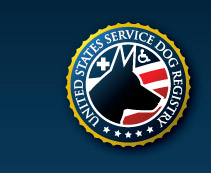|
What is a Service or Assistance Dog?
Service Dogs are a special type of working dog that are trained to help a disabled individual complete work or tasks directly related to their disability.
The Americans with Disabilities Act defines a Service Dog as:
§ 35.104 Definitions. Service animal means any dog that is individually trained to do work or perform tasks for the benefit of an individual with a disability, including a physical, sensory, psychiatric, intellectual, or other mental disability. Other species of animals, whether wild or domestic, trained or untrained, are not service animals for the purposes of this definition. The work or tasks performed by a service animal must be directly related to the individual's disability. Examples of work or tasks include, but are not limited to, assisting individuals who are blind or have low vision with navigation and other tasks, alerting individuals who are deaf or hard of hearing to the presence of people or sounds, providing non-violent protection or rescue work, pulling a wheelchair, assisting an individual during a seizure, alerting individuals to the presence of allergens, retrieving items such as medicine or the telephone, providing physical support and assistance with balance and stability to individuals with mobility disabilities, and helping persons with psychiatric and neurological disabilities by preventing or interrupting impulsive or destructive behaviors. The crime deterrent effects of an animal's presence and the provision of emotional support, well-being, comfort, or companionship do not constitute work or tasks for the purposes of this definition.
Types of working dogs that may not be registered on this website:
Emotional Support Animals These are an important type of working dog which provides a calming influence and comfort to their owner. They are not Service Dogs, but are covered under the Fair Housing Act and may be allowed to fly in-cabin. Please contact your airline for details.
Therapy Dogs These are dogs which are trained to help and comfort people other than their owners. Those they help and comfort may or may not be disabled. They can help teach, lift spirits, assist with physical and emotional rehabilitation and more.
Other examples dogs that may not be registered are Companion Animals, Comfort Animals, Police Dogs, Military Working Dogs, Search and Rescue Dogs, Forensic Dogs and others.
I'm not ready yet.
I understand and choose to continue.
|



